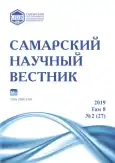Наследие империй: академическая экспертиза и политика США в Афганистане и Ираке в 2001-2014 годах
- Авторы: Малкин С.Г.1
-
Учреждения:
- Самарский государственный социально-педагогический университет
- Выпуск: Том 8, № 2 (2019)
- Страницы: 313-318
- Раздел: 07.00.00 – исторические науки и археология
- URL: https://journal-vniispk.ru/2309-4370/article/view/34336
- DOI: https://doi.org/10.17816/snv201982232
- ID: 34336
Цитировать
Полный текст
Аннотация
Обращение с наследием европейских колониальных империй следует воспринимать как «недостающее измерение» в изучении истории внешней политики США в начале XXI в. Речь должна идти не только о сравнительно-историческом анализе, но и об изучении трансферов колониального опыта европейских держав, что способствует формированию более полной картины империализма как не только явления в истории международных отношений, но и определенного стиля мышления в эпоху деколонизации. При этом американский случай стал самым ярким примером рецепции колониального опыта европейских держав в политической практике 2000-х гг. Характерной особенностью экспертизы внешнеполитических решений в США являлась ее реализация в форме исторического моделирования асимметричных конфликтов - анализа перспектив политики Вашингтона в Афганистане и Ираке в широком контексте опыта глобальных колониальных империй. Не удивительно, что при работе с такого рода исследованиями необходима постоянная методологическая рефлексия, обусловленная не только их политической ангажированностью, но и ограничениями дисциплинарного характера. При этом особая роль в данном случае принадлежала представителям академического мира, профессионально изучавшим колониальный опыт европейских держав. Именно они составили наиболее серьезную конкуренцию представителям Пентагона с академическими степенями и аналитикам сотрудничающих с военными «фабрик мысли» в борьбе за доминирование собственного экспертного мнения в рамках дискурса об историческом моделировании асимметричных конфликтов на Ближнем и Среднем Востоке. Именно об этом аспекте академической экспертизы политики США в Ираке и Афганистане в 2001-2014 гг. и пойдет речь в настоящей статье.
Полный текст
Открыть статью на сайте журналаОб авторах
Станислав Геннадьевич Малкин
Самарский государственный социально-педагогический университет
Автор, ответственный за переписку.
Email: s.g.malkin@mail.ru
доктор исторических наук, доцент, заведующий кафедрой всеобщей истории, права и методики обучения
Россия, СамараСписок литературы
- Gilman N. Mandarins of the Future: modernization theory in Cold War America. Baltimore: Johns Hopkins University Press, 2003. 344 p.
- Heir A., Robinson N. State-Building: Theory and Practice. London: Routledge, 2007. 220 p.
- From Nation-Building to State-Building / Ed. by M.T. Berger. London-New York: Routledge, 2008. 211 p.
- Simpson B. Economists with Guns: authoritarian development and U.S.-Indonesian relations, 1960-1968. Stanford: Stanford University Press, 2008. 376 p.
- Kuzmarov J. Modernizing Repression: Police Training, Political Violence, and Nation-Building in the American Century // Diplomatic History. 2009. № 33 (2). P. 191-222.
- Badger A. Historians, a legacy of suspicion and the «migrated archives» // Small Wars & Insurgencies. 2012. Vol. 23, № 4-5. P. 799-807.
- Mumford A. The Counter-Insurgency Myth: The British Experience of Irregular Warfare. London: Routledge, 2012. 216 p.
- Rich P.B. A historical overview of US counter-insurgency // Small Wars & Insurgencies. 2014. Vol. 25, № 1. P. 5-40.
- Ucko D.H. Critics gone wild: Counterinsurgency as the root of all evil // Small Wars & Insurgencies. 2014. Vol. 25, № 1. P. 161-179.
- Reis B.C. The Myth of British Minimum Force in Counterinsurgency Campaigns during Decolonisation (1945-1970) // Journal of Strategic Studies. 2011. Vol. 34, № 2. P. 245-279.
- Porch D. The dangerous myths and dubious promise of COIN // Small Wars & Insurgencies. 2011. Vol. 22, № 2. P. 239-257.
- Mockaitis T.R. The minimum force debate: contemporary sensibilities meet imperial practice // Small Wars & Insurgencies. 2012. Vol. 23, № 4-5. P. 762-780.
- Jones D.M., Smith M.L.R. Myth and the small war tradition: Reassessing the discourse of British counter-insurgency // Small Wars & Insurgencies. 2013. Vol. 24, № 3. P. 436-464.
- Michaels J.H., Ford M. Bandwagonistas: rhetorical redescription, strategic choice and the politics of counter-insurgency // Small Wars & Insurgencies. 2014. Vol. 22, № 2. P. 352-384.
- Field Manual, Marine Corps Warfighting Publication 3-33.5 // Counterinsurgency. United States Army Headquarters and United States Marine Corps Combat Development Command. Washington, DC, 15 December 2006.
- Hevia J. The Imperial Security State. British Colonial Knowledge and Empire-Building in Asia. Cambridge: Cambridge University Press, 2012. 304 p.
- O'Cadhla S. Civilizing Ireland. Ordnance Survey 1824-1842: Ethnography, Cartography, Translation. Dublin-Portland: Irish academic Press, 2007. 280 p.
- Plank G. An Unsettled Conquest: The British Campaign against the Peoples of Acadia. Philadelphia: University of Pennsylvania Press, 2001. 239 p.
- Plank G. Rebellion and Savagery: The Jacobite Rising of 1745 and the British Empire. Philadelphia: University of Pennsylvania Press, 2006. 259 p.
- French D. Army, Empire and Cold War: The British Army and Military Policy, 1945-71. Oxford: Oxford University Press, 2012. 346 p.
- Thomas M. Empires of Intelligence. Security Services and Colonial Disorder after 1914. Berkeley-Los Angeles: University of California Press, 2008. 428 p.
- Walton C. Empire of Secrets: British Intelligence, the Cold War and the Twilight of Empire. London: Harper Press, 2013. 448 p.
Дополнительные файлы






